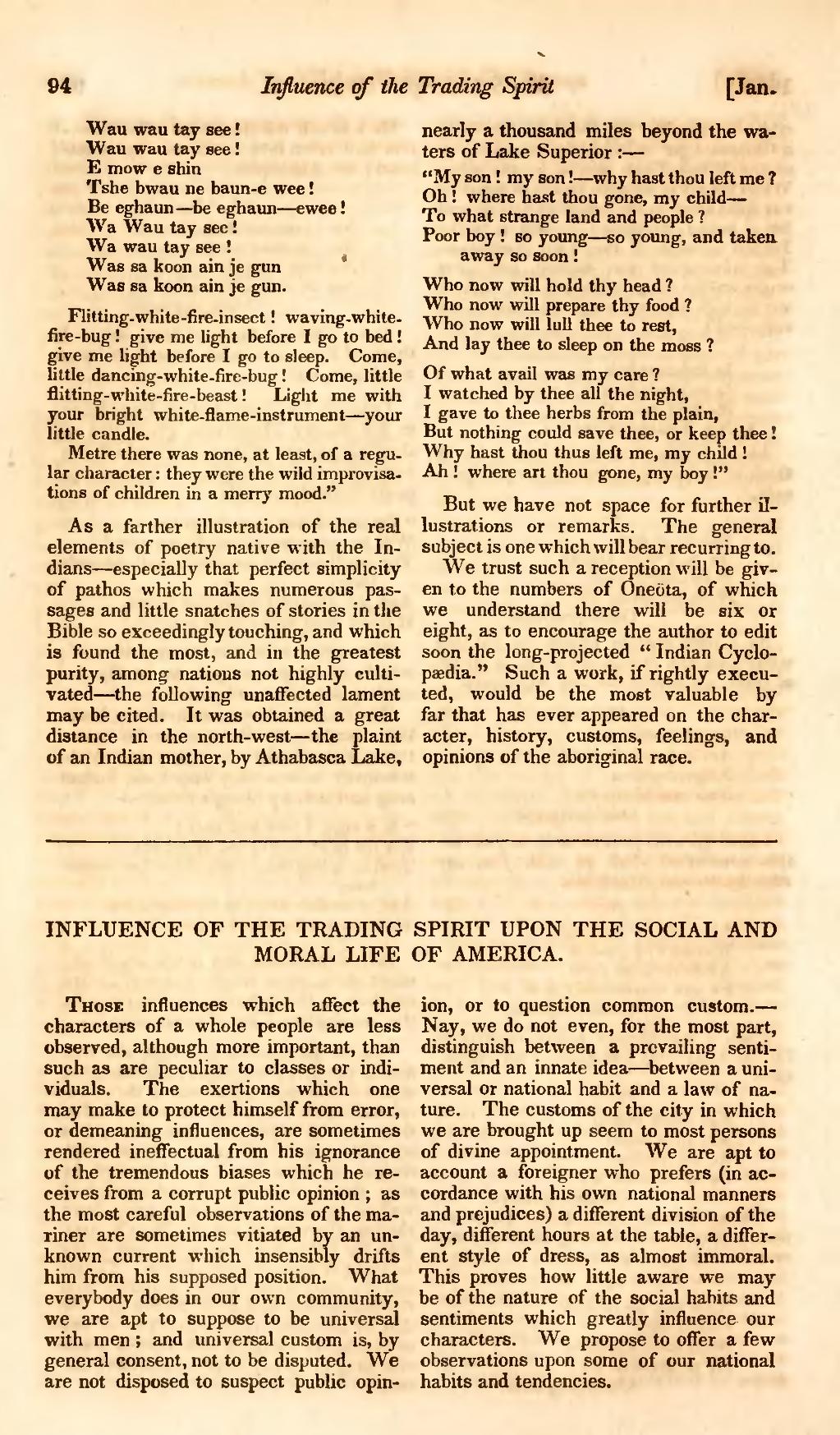Wau wau tay see!
Wall wau tay see!
E mow e shin
Tshe bwau ne baun-e wee!
Be eghaun—be eghaun—ewee!
Wa Wau tay see!
Wa wau tay see!
Was sa koon ain je gun
Was sa koon ain je gun.
Flitting-white-fire-insect! waving-white-fire-bug! give me light before I go to bed! give me light before I go to sleep. Come, little dancing-white-fire-bug! Come, little flitting-white-fire-beast! Light me with your bright white-flame-instrument—your little candle.
Metre there was none, at least, of a regular character: they were the wild improvisations of children in a merry mood."
As a farther illustration of the real elements of poetry native with the Indians—especially that perfect simplicity of pathos which makes numerous passages and little snatches of stories in the Bible so exceedingly touching, and which is found the most, and in the greatest purity, among nations not highly cultivated—the following unaffected lament may be cited. It was obtained a great distance in the north-west—the plaint of an Indian mother, by Athabasca Lake, nearly a thousand miles beyond the waters of Lake Superior:—
"My son! my son!—why hast thou left me?
Oh! where hast thou gone, my child—
To what strange land and people?
Poor boy! so young—so young, and taken away so soon!
Who now will hold thy head?
Who now will prepare thy food?
Who now will lull thee to rest,
And lay thee to sleep on the moss?
Of what avail was my care?
I watched by thee all the night,
I gave to thee herbs from the plain,
But nothing could save thee, or keep thee!
Why hast thou thus left me, my child!
Ah! where art thou gone, my boy!"
But we have not space for further illustrations or remarks. The general subject is one which will bear recurring to.
We trust such a reception will be given to the numbers of Onecita, of which we understand there will be six or eight, as to encourage the author to edit soon the long-projected "Indian Cyclopaedia." Such a work, if rightly executed, would be the most valuable by far that has ever appeared on the character, history, customs, feelings, and opinions of the aboriginal race.
INFLUENCE OF THE TRADING SPIRIT UPON THE SOCIAL AND MORAL LIFE OF AMERICA.
Those influences which affect the characters of a whole people are less observed, although more important, than such as are peculiar to classes or individuals. The exertions which one may make to protect himself from error, or demeaning influences, are sometimes rendered ineffectual from his ignorance of the tremendous biases which he receives from a corrupt public opinion; as the most careful observations of the mariner are sometimes vitiated by an unknown current which insensibly drifts him from his supposed position. What everybody does in our own community, we are apt to suppose to be universal with men; and universal custom is, by general consent, not to be disputed. We are not disposed to suspect public opinion, or to question common custom.—Nay, we do not even, for the most part, distinguish between a prevailing sentiment and an innate idea—between a universal or national habit and a law of nature. The customs of the city in which we are brought up seem to most persons of divine appointment. We are apt to account a foreigner who prefers (in accordance with his own national manners and prejudices) a different division of the day, different hours at the table, a different style of dress, as almost immoral. This proves how little aware we may be of the nature of the social habits and sentiments which greatly influence our characters. We propose to offer a few observations upon some of our national habits and tendencies.
